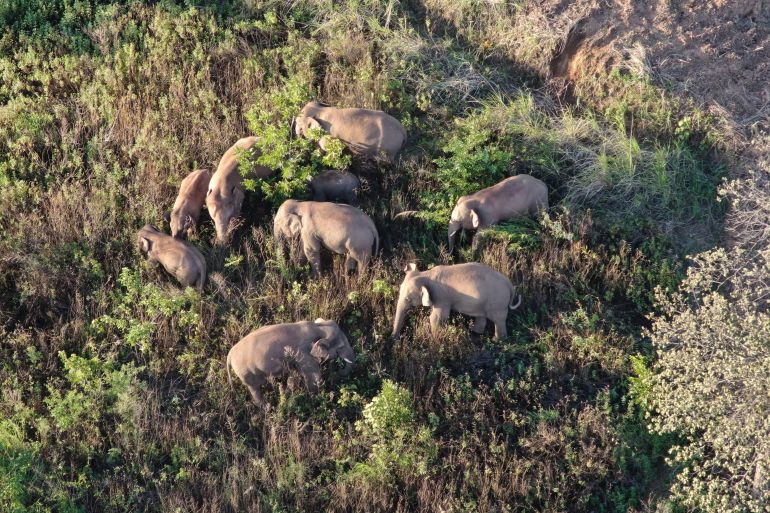Thirsty elephants rampage through north Cameroon city
Forestry and wildlife official Jean Nyemeg said elephants trampled a child to death this week in a village near Maroua.

Wildlife officials in north Cameroon are struggling against a marauding herd of elephants that wandered into a regional capital this week after trampling through surrounding villages and killing at least two people.
An estimated 6,830 elephants live in Cameroon, according to the International Union for Conservation of Nature, making it one of the largest populations of the endangered species left in Africa.
Keep reading
list of 4 itemsDida, Africa’s ‘largest’ female tusked elephant, dies in Kenya
Photos: Thailand’s out-of-work elephants in crisis
Experts powerless as herpesvirus kills 3 elephants at Zurich zoo
Conservation efforts have increased their numbers over the past years. But the loss of habitat to plantations and villages can cause the animals to occasionally wander into human settlements, trampling crops and homes, and sometimes charging people.
Forestry and wildlife official Jean Nyemeg said elephants trampled a child to death this week in a village near Maroua, the capital of Cameroon’s Far North region. The four elephants then made two incursions into Maroua itself.
“The elephants moved in search of water due to the arid nature of the region,” Nyemeg said, adding that the herd was first spotted near the border with Chad.
Footage shared on social media showed people scattering and taking videos with their phones as the herd wandered down asphalt roads.
Rangers on foot have been trying to woo them into a national park about 120km (75 miles) from Maroua, Nyemeg said.
The deputy mayor of the nearby Kalfou district, Oumarou Tamboutou, said the elephants killed a man there last week.
The Ministry of Forests and Wildlife said in a statement that the animals were migrating to the Waza National Park when a crowd of onlookers, unaware of the danger, blocked the route.
The disoriented elephants killed a person, named Bintou, in the locality of Balda, the ministry said and asked locals not to approach the animals as they were still moving towards the national park.
Wildlife groups in Cameroon have been seeking to resolve the conflict between elephants and humans, which has led to street protests in the past, and prevent poaching.
Climate change-linked droughts have exacerbated tensions, as thirsty elephants are more likely to encroach villages and towns.
“When there is no water in one place, they migrate to others where they can find water and other resources,” said Adamou Aboubakar, a local development officer for the African Wildlife Foundation.